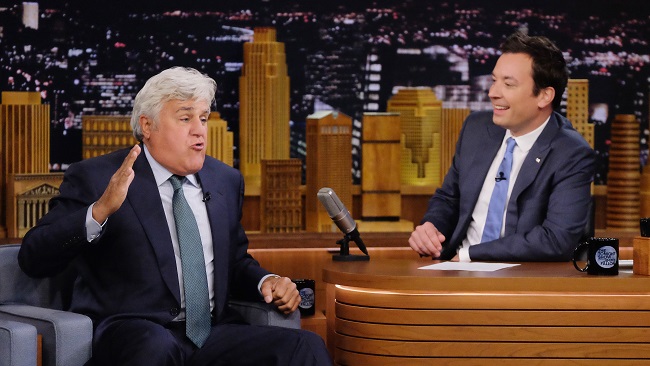On Wednesday night, in response to President Donald Trump’s threats to pull NBC and other networks’ broadcast licenses for negative coverage that he deems “fake news,” Jimmy Kimmel said that the time to pull those licenses is “Never. Because that’s what dictators do.” On The Tonight Show, which airs on NBC, Jimmy Fallon sidestepped the terrifying issue of a President trying to silence the free press and instead cracked a joke about people being upset over the loss of This Is Us if NBC lost its license.
Chaotic times like these often call for voices that speak with passion, clarity, and authority — even in comedy. Jimmy Fallon can’t deliver that kind of product and it might be hurting his show’s ratings. Once the late-night king, Fallon is in danger of falling to third place in total viewers (he still holds the lead in viewers under 50, though that’s slipping as well) behind Stephen Colbert (who seized first place earlier this year) and Kimmel.
It’s hard to consider Fallon a mere victim of changing cultural tides, though. Nobody put his hand on Donald Trump’s head and told him to tousle the polarizing future President’s hair in an epic misread of the cultural “room.” But while that moment made it hard to take any of his efforts to mock the Trump presidency seriously, it’s not the only reason that his show is falling in the ratings race and out of relevancy.
Even if Fallon hadn’t legitimized Trump’s effort to try and seem human, his natural comedic tendency toward silliness and half-hearted monologue jabs would have made it hard for him to take on the Trump presidency with the vigor that his competitors have brought to the task. It’s not that Fallon is waving pom-poms when Trump plays the part of the bully, punches down, or threatens free speech. He came out swinging in response to what may be Trump’s most troubling moment (the divisive and despairing “many sides” response to Charlottesville), but he knows he’s not Seth Meyers or Stephen Colbert. Jimmy Fallon’s brand is fun and games, and in a way, that’s fine. Late night shows are formulaic enough. Not everyone likes to feel as though the nightly news is bleeding into their late-night comedy and not everybody likes goofiness when it seems like the world is melting.

Where Fallon is at a disadvantage, however, is that while many people still enjoy his show (on TV and via YouTube clips), the buzz in the zeitgeist now seems to be with those shows that traffic in substance. Or the shows that manage to do fun bits that feel unique, like Conan O’Brien’s field-skewering car ride/kidnapping with Tom Cruise or Larry David basically doing a Curb Your Enthusiasm short in Meyers’ writer’s room. That’s what sites are looking to highlight the next morning and what people are talking about on social media. And that might be a bigger problem for Fallon than the crystallized image of him humanizing Donald Trump, because when was the last time one of his segments or games felt fresh or got the internet’s full attention?
That kind of attention used to be a constant for Fallon, who established himself using those common party games and goofy premises to focus on celebrity antics when he took over Late Night from Conan and then when he replaced Jay Leno as the host of The Tonight Show. I don’t want to take away from how important this was. Fallon was partly responsible for keeping late night relevant by connecting with a younger audience through YouTube clips (where he’s still king, though Kimmel has pulled in more new subscribers over the last three months) and Twitter hashtags. Like David Letterman in the ’80s when he stood in contrast to Johnny Carson’s buttoned-up late-night style, Fallon was there for an audience that maybe felt as though they weren’t represented by the old guard of Leno and, well, Letterman in the 2010s.
Most late-night hosts outlast their original shtick. By the end of his legendary run, Letterman had morphed into a wizened crank after spending decades as the smart-assed ringleader of a weird circus. Jon Stewart went from being a comedian on an actual fake news show to “America’s most trusted news anchor.” Maybe it’s time for Fallon to shake things up and embrace the creativity that helped establish him as a vibrant populist force in late night, setting aside Thank You Notes, Password, and other such things that have gotten a little bit stale. The challenge of reinvention might do him some good. Look at Conan’s second act on TBS where he more fully embraced remotes and splashy travel episodes, eschewing most of the beloved bits from his NBC days after laying down a self-imposed block on carrying them over.
Resisting the call to evolve and challenge himself is, of course, an option as well. Even though he seems to be trending in the wrong direction (or, at least, standing still), Fallon is still doing comparatively well and these things can come back around. Maybe at some point, Colbert and Kimmel’s viewers will start to crave the distinctly different brand of late night fun that Fallon offers. But it’s a gamble that could maroon Fallon on a path toward an uninspiring and creatively bare future where people watch the show out of habit more than excitement. And if that happens, that’ll be how Jimmy Fallon becomes Jay Leno, a late night host who stubbornly refused to change with the times or stray from the formula that had made him the technical king of late night even though he lost the critics and the zeitgeist a long time ago.






